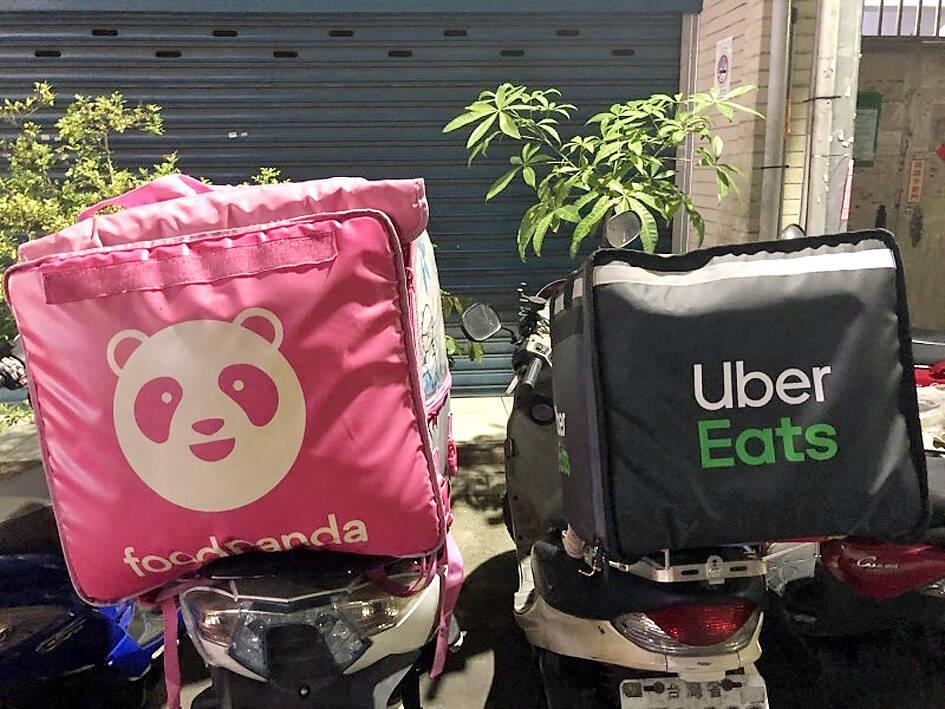Uber Eats is giving up its plan to acquire Foodpanda’s Taiwan delivery service and must pay a fee of US$250 million for canceling the agreement, reports said today.
Uber Technologies Inc announced its plan to buy Delivery Hero SE’s Foodpanda business in Taiwan for US$950 million in May last year.
The deal was prohibited by the Fair Trade Commission in December due to concerns about competition.

Photo: Bill Chen, Taipei Times
If Uber acquired Foodpanda, it would monopolize more than 90 percent of the food delivery market in Taiwan, which may lead to raised prices, Reuters and Bloomberg cited the commission as saying.
Uber was disappointed with the commission’s ruling, but would respect it and would not appeal, a spokesperson for the company said in a statement to Bloomberg.
“We remain committed to the Taiwan market and would continue to serve local consumers, businesses and delivery partners in an innovative and competitive manner,” the spokesperson said.
Taiwan remains a part of Delivery Hero’s long-term strategy, the company said.
The original deal also specified that Uber would buy US$300 million worth of Delivery Hero’s newly issued stocks.
The collapse of the merger would not affect this share purchase agreement, Delivery Hero told Reuters.

Alain Robert, known as the "French Spider-Man," praised Alex Honnold as exceptionally well-prepared after the US climber completed a free solo ascent of Taipei 101 yesterday. Robert said Honnold's ascent of the 508m-tall skyscraper in just more than one-and-a-half hours without using safety ropes or equipment was a remarkable achievement. "This is my life," he said in an interview conducted in French, adding that he liked the feeling of being "on the edge of danger." The 63-year-old Frenchman climbed Taipei 101 using ropes in December 2004, taking about four hours to reach the top. On a one-to-10 scale of difficulty, Robert said Taipei 101

Nipah virus infection is to be officially listed as a category 5 notifiable infectious disease in Taiwan in March, while clinical treatment guidelines are being formulated, the Centers for Disease Control (CDC) said yesterday. With Nipah infections being reported in other countries and considering its relatively high fatality rate, the centers on Jan. 16 announced that it would be listed as a notifiable infectious disease to bolster the nation’s systematic early warning system and increase public awareness, the CDC said. Bangladesh reported four fatal cases last year in separate districts, with three linked to raw date palm sap consumption, CDC Epidemic Intelligence

Two Taiwanese prosecutors were questioned by Chinese security personnel at their hotel during a trip to China’s Henan Province this month, the Mainland Affairs Council (MAC) said yesterday. The officers had personal information on the prosecutors, including “when they were assigned to their posts, their work locations and job titles,” MAC Deputy Minister and spokesman Liang Wen-chieh (梁文傑) said. On top of asking about their agencies and positions, the officers also questioned the prosecutors about the Cross-Strait Joint Crime-Fighting and Judicial Mutual Assistance Agreement, a pact that serves as the framework for Taiwan-China cooperation on combating crime and providing judicial assistance, Liang

US climber Alex Honnold left Taiwan this morning a day after completing a free-solo ascent of Taipei 101, a feat that drew cheers from onlookers and gained widespread international attention. Honnold yesterday scaled the 101-story skyscraper without a rope or safety harness. The climb — the highest urban free-solo ascent ever attempted — took just more than 90 minutes and was streamed live on Netflix. It was covered by major international news outlets including CNN, the New York Times, the Guardian and the Wall Street Journal. As Honnold prepared to leave Taiwan today, he attracted a crowd when he and his wife, Sanni,